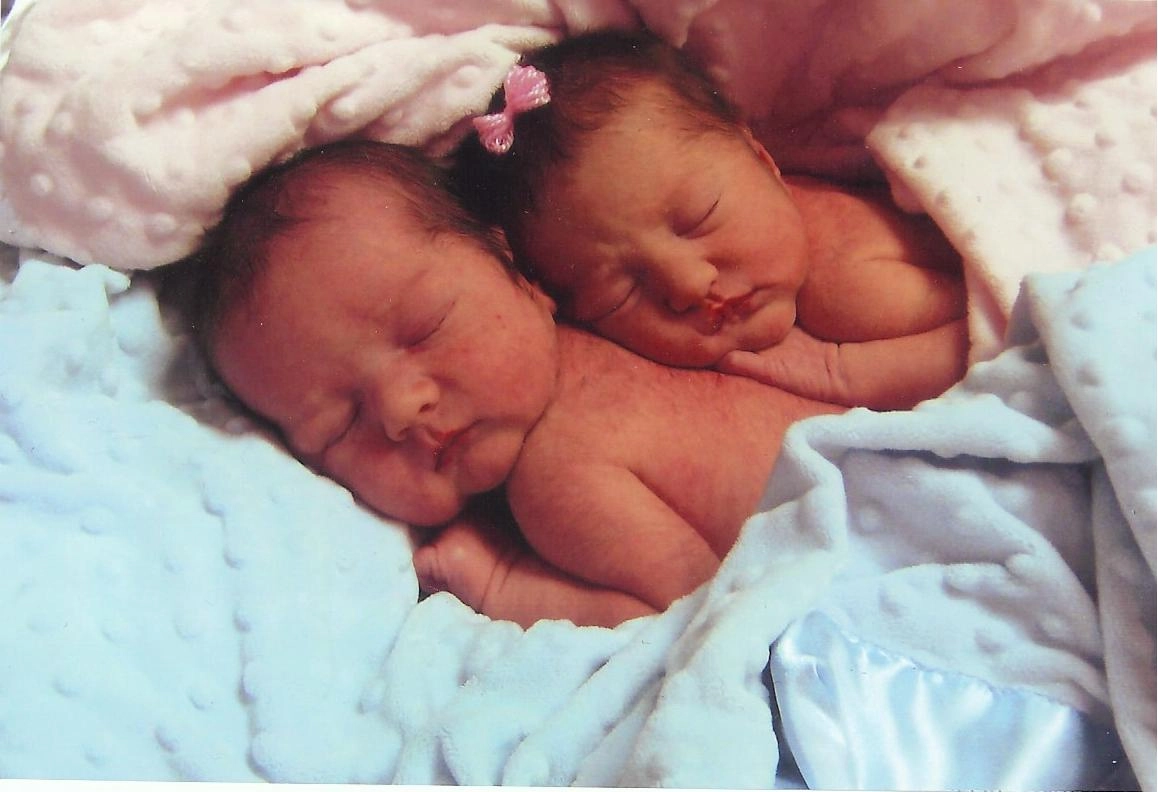Finding out we were expecting twins was absolutely shocking. Everyone makes the joke at some point, but we certainly did not believe that we would be the ones.
Once you have twins, you find yourself in the company of twins, twin parents, or family members of twins more often than you expect. I wish that had been around more often before ours arrived because though I read all the articles, many books, and listened intently as my doctor spoke, I never fully knew what to expect. That’s my goal here: to give those who are in my 2019 shoes today a clearer picture of what it’s like to carry, birth, and begin life with twins.
Looking back, it was a very wild journey from the moment we found out we were expecting to life with our babies today. Even as I sit here organizing my thoughts around isolated events, I am in awe.
As I attempt to share the most memorable and unique parts of our experience, I want to preface here that I am not a medical professional—I am simply a mother trying to care for two babies at once—and that there were many other symptoms I experienced while pregnant and thereafter, but those outlined here were specific to having twins, or at least I was told they were.
Carrying Twins
Extra doctor appointments were part of the package.
I had standing appointments with my regular doctor, appointments with an MFM, and regular nonstress tests—sometimes all on the same day, and often on different days within the same week. We developed really great relationships with the staff.
37 weeks was the goal.
A twin pregnancy is different from a singleton pregnancy. Everything is measured gestationally, meaning a full-term twin pregnancy hits sooner than a singleton. It’s as if I was “at capacity” sooner, which makes sense since there are two occupying the space, not just one. Needless to say, we didn’t make it to 37 weeks.
On that note, I had this irrational fear that my stomach was going to turn into the shape of a watermelon on its side, but our bodies are absolutely amazing. Worrying about these silly things is so not worth the stress, especially when you’re about to welcome two beautiful babes.
My doctor requested I work from home after a certain point in my pregnancy.
It’s a high-risk pregnancy, and though it’s easy to lump that into one big bucket, the term can actually mean a lot of things. In my case, I worked in downtown Chicago, and my fear was that, if my water was to break while downtown, surrounded by traffic, chaos, and spectators, it would be an emergency, and they worried I wouldn’t make it to the hospital in time. Once I hit 34 weeks, my doctor requested that I no longer make the trip downtown, though she wanted me to start this sooner. My doctor was very laid back and had a cool approach to everything, so I trusted her request was strategic. This did not sit well with my employer at the time though, and I was asked at the tail-end of my last day in the office to “reconsider” working from home, being told that I was one of the many women who have had a “high-risk pregnancy” and that I was still six weeks out from a full-term 40 weeks. “We’ve all been through it” were her exact words. Her lack of understanding that a full-time singleton pregnancy is different from a full-term twin pregnancy proved how unqualified she was to request such a thing from me. Bottom line: your doctor knows what’s best for you and your babies.
The chance of developing preeclampsia is higher with multiples—and it happened. Twice.
I kept hearing the word “preeclampsia” knowing it was a concern. But, until this time in my life, I didn’t really have a lot of knowledge about this condition—minus the fact that Kim Kardashian had it. Honestly, it’s a bit of an anomaly. They don’t really know everything about why it happens, but it’s believed to be related to the condition of the placenta. In the case of our mono-di twins, we had two babies sharing one placenta (hence identical!), and you can imagine the amount of stress that puts on one support system.
Once I was in my third trimester, I experienced preeclampsia without knowing it. I had a pounding headache, and when I went to pee for the 100th time while at the doctor’s office, I saw silver flecks floating all around me. I didn’t realize these were the “spots” everyone was constantly asking me about, so I chalked it up to being hungry and low sugar. I ate some cookies, and we went home and carried on. A few weeks later, I’m 35 weeks pregnant, at a nonstress test appointment with my husband, laughing casually about nothing, when a nurse walks in and says they’re calling a doctor in because my blood pressure is elevated—the most telling sign of preeclampsia. They delivered our babies the next day.
Delivery is typically the solution to preeclampsia, but occasionally it rears its ugly head again. Days after I delivered, I was planning my release from the hospital, and my blood pressure began to rise again. After monitoring it for a while, they resorted to their last resort: magnesium. For 24 hours, I was bedridden as magnesium was pumped into me via an IV and exited through a catheter. This is less than common, and waiting nearly a year to welcome your two babies shouldn’t be out shadowed by the fear of this happening.
Delivering Twins
I planned for a natural birth, but mentally, I prepared for a C-section.
Let me first say that I didn’t picture myself having a C-section or a natural birth in a chair with my feet planted in stirrups; I actually found the most comfort in the idea of water birth. But once I found out I was having twins, I knew that was out of the question.
Baby A called the shots here because her position ultimately determined what kind of birth it would be. And for me, with every ultrasound, Baby A was in a different position, making it hard to get comfortable with one birth plan over another. To know her today is to realize how fitting this fickle behavior was (God, I love her).
A C-section is actually a pretty peaceful experience. Don’t let the fear of it muddy the experience of welcoming your beautiful babes. I wondered where my thoughts would go while I was laying on the table, conscious during surgery. My husband gently rubbing my hand kept me present and focused on him instead of what was going on behind the curtain. I highly recommend this.
Life with Newborn Twins
Preemies and time in the NICU.
Our babies arrived at 35 weeks and 2 days. One came home after 7 days in the NICU and the other spent 10 days there. We were lucky to bring Baby A home on the same day that I was discharged, but it was certainly tough leaving our sleepy Baby B behind. The wonderful nursing staff took amazing care of her though, and it helped me retain my sanity throughout the entire process. Now, who do I blame for all of the extra energy this kid has today because I’m starting to think there’s a connection between her wildness and her extended stay in the NICU. I’ve got a bone to pick with someone.
A visit with a lactation consultant was so worth it.
Breastfeeding and pumping were difficult and often painful, but we got there. I often felt like I was ready to throw in the towel (and it’s ok if you do), but a visit with a lactation consultant made all the difference for me, especially because she herself was a mother of twins. Everything changed for the better after one hour with her. Ah, the power of empathy.
There are no two-for-one deals, especially with insurance and diapers.
We are still paying off medical bills today, and we hit our deductible before our babies were born.
On the diaper front, Costco is king, and I encourage any mom expecting twins to ask for as many diapers in various sizes as possible before their arrival.
Sleeping together was encouraged.
We were encouraged to have our babies sleep in the same room, whether that was our room or their own. In consideration of SIDS, we opted to have two bassinets in our bedroom until they were old enough to move to their own room with a sound machine. Living in the city, we had limited space, and though we had two mini cribs set up, they ended up sleeping in one side-by-side since they were so itty bitty and barely moved throughout the night. Now that they’re older, we recognize that they’re very different sleepers; we joke that one sleeps to rest, and the other sleep to recharge. One is up with the sun and the other needs a little more time. Regardless of their sleeping style though, it’s common for them to sleep through each other’s outbursts, but it’s also common for them to wake one another up when they’re being silly at odd hours. This has led to us separating them at nap time and often in the early hours of the morning.
Nighttime is a nightmare in the beginning.
It’s no secret that a newborn baby keeps new parents up all night. Well, take that singleton schedule and double it because the nights are doubly terrible. Sorry, sometimes the truth hurts. The good news is that things will normalize. For us, routine started taking shape around month 6, and though we met a few sleep regressions over time, extended sleep was eventually a regular thing.
Structure is everything.
We utilized Babywise to try to establish some routine in our home, but no matter how organized (or borderline OCD in my case) we were, two new babies brought two new layers of chaos to our home. They don’t care if you were up twenty minutes ago with their sibling, they’re hungry now! Stick with the routine, and order will follow. Sort of.
It’s ok to ask for help.
All parents have their own personal arrangements, so caring for the babies will obviously look different for everyone. I am fortunate to have a partner who went into this chapter fully expecting to do half (oftentimes more) of the work, including middle-of-the-night feedings. Ultimately, we worked out a schedule. He got up with the babies until around 3 a.m., after which, I took over; moving myself and the babies into the nursery, handling the remaining wakeups, and allowing my husband to get some sleep. This worked for us because, in the end, we both felt like we were getting extended sleep. My best advice is, if your partner is getting parental leave (and I sincerely hope they do), experiment with sharing the middle-of-the-night responsibilities. Your body is going through so much after delivering a human—physically, mentally, emotionally—and you deserve a little break here and there. Even if this shared time is temporary, the extra help and rest will be invaluable as you recover.
It’s also ok to ask for space.
I was warned about people touching my belly without my permission, but I never expected half the attention having twins would bring me. In fact, I can’t recall a time when a stranger touched my pregnant belly, but I can certainly recall every time someone approached to gush or peek at our newborn twins. It certainly makes you feel a little extra special, but the discomfort quickly set in for my husband and me. Before we knew it—without our permission—people were in our personal space, pushing back the covers that shielded our babies’ faces for a better look.
Other than your new babies, you don’t owe anyone anything immediately following birth. Texts can wait, work emails can absolutely wait, and visits from family and friends can wait. This time is precious and short-lived. Soak it in.
“Everybody falls in love differently.”
This was exactly what I needed to hear during the weeks following the birth of my twins, and I was fortunate enough to have a close friend (already a momma) who checked in on me often, especially my mental and emotional state. Not just that, she asked questions that allowed me to simply answer yes or no, rather than having to explain myself. I thought I would have this instant connection the moment I saw my babies, as they do in the movies—my husband did—but all I experienced was exhaustion. As a new mother, you give and give and give. Having someone reach in rather than having to reach out made all the difference when I was experiencing the baby blues. My best advice here is to assign someone close to you to check in on you post-delivery, especially someone who can empathize with what you’re going through. They know what you need to hear and how little effort you want to put into explaining yourself.
Babies change everything. x2.
This is nothing short of an understatement.
General Ah-ha’s!
The million-dollar twin question.
No, they don’t run in either of our families because identical twins are not genetic.
I’m not the exception.
My pregnancy was rather uneventful (thankfully!), and I had a lot of natural exercises built into my years of living in the city and taking public transport, but that didn’t stop me from experiencing some Braxton Hicks around week 25, and preeclampsia before and after delivering, or the baby blues. I thought I would be able to withstand more, especially early on, but by week 14, I was feeling winded by a simple walk.
For those expecting, it’s okay to be honest with yourself and others about how you’re feeling—physically, mentally, and emotionally. PPD is a real thing, and I hope you’ll talk to your doctor if you think you may be experiencing symptoms of it. Shoutout to those helping to normalize the conversation around mental health.
No one knows what it’s like to have (or be pregnant with) twins except for the parents of twins.
There’s a lot of unsolicited advice that comes your way no matter what you’re having, but having this phrase said to me when I was roughly 7 months pregnant was so profound, and it’s lived in my mommy brain ever since. It’s a solid motto to replay in your head when someone says the wrong thing to you.
Fostering individuality is important.
It’s cute to dress twins alike—we’re certainly guilty of this—but we always try to keep in mind the two different people we’re helping to shape. From the very beginning, we could tell a difference in personality, and though they’re very yin and yang, I always try to keep in mind the people they will grow into and how I, myself, felt when I was an adolescent and teenager. I want to make sure that when they get there, neither one feels like they’re simply part of a matching set.
Little efforts go a long way when you’re feeling overwhelmed as a new parent. I hope this snapshot of my experience helps to provide some insight and perspective into what it’s like welcoming multiples, and that it offers those expecting, and those adjacent to those expecting ideas for how to support new twin-parents-to-be.






